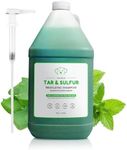We Use CookiesWe use cookies to enhance the security, performance,
functionality and for analytical and promotional activities. By continuing to browse this site you
are agreeing to our privacy policy
Best Antifungal Dog Shampoo For Yeast
From leading brands and best sellers available on the web.#2

Vedco
10%OFF
Chlorhex Anti Fungal Shampoo 8 oz
View Product
#3

Dorjon Smart Skincare
Tar Sulfur Medicated Dog Shampoo and Conditioner, Skin Conditions, Itch Relief, Antifungal Dog Shampoo, Flea Treatment, and Mange Care, 1 Gallon with Pump Oatmeal, Puppy & Smelly Dog Formula
View Product
#4

SOOS
Soos Pet Shampoo Mineral Rich Mud Natural Dead Sea Cruelty Free Fast Absorbing Skin Cooling First Aid Antib-acterial and Antif-ungal Odor Remover for Dogs and Cats - 1x Pet Shampoo (500ml)
View Product
#5

Miracles of Faith Co.
FaithPets Deshedding & Dandruff Pet Shampoo -Organic Pomegranate, Organic Almond & Chlorhexidine Dog Shampoo to Soothe Dry Skin. Odor Elimination, Loosens & Combats Shedding 8 Fl Oz
View Product
Buying Guide for the Best Antifungal Dog Shampoo For Yeast
Choosing the right antifungal dog shampoo for yeast is important for your pet’s comfort and health. Yeast infections can cause itching, redness, and discomfort, so a good shampoo can help manage symptoms and support healing. When shopping, focus on the ingredients, safety, and how gentle the formula is for your dog’s skin. Always consult your veterinarian if you’re unsure or if your dog’s condition is severe.Active IngredientsActive ingredients are the substances in the shampoo that target yeast and other fungi. Common ones include chlorhexidine, ketoconazole, and miconazole. These ingredients are important because they directly fight the yeast causing your dog’s skin issues. Some shampoos may also include natural antifungal agents like tea tree oil or aloe vera. When choosing, look for shampoos with proven antifungal ingredients. If your dog has sensitive skin, you might want to avoid harsh chemicals and opt for milder, natural options. Always check with your vet if you’re unsure which ingredient is best for your dog’s specific needs.
Moisturizing PropertiesMoisturizing properties refer to how well the shampoo helps keep your dog’s skin hydrated. Yeast infections can dry out the skin, so a shampoo with moisturizers like oatmeal, aloe vera, or coconut oil can help soothe irritation and prevent further dryness. If your dog’s skin is very dry or flaky, prioritize shampoos with strong moisturizing benefits. For dogs with normal skin, a balanced formula is usually sufficient.
pH BalancepH balance means how acidic or alkaline the shampoo is. Dogs have a different skin pH than humans, so it’s important to use a shampoo formulated for dogs to avoid irritation. A pH-balanced shampoo helps maintain your dog’s natural skin barrier, which is important for healing and preventing future infections. Always choose a shampoo labeled as pH-balanced for dogs, especially if your pet has sensitive or allergy-prone skin.
Fragrance and AdditivesFragrance and additives are extra ingredients added for scent or appearance. While a pleasant smell can be nice, some fragrances and dyes can irritate sensitive or infected skin. If your dog is prone to allergies or has a current yeast infection, it’s best to choose a shampoo with minimal or no added fragrance and avoid unnecessary additives. Unscented or hypoallergenic formulas are often the safest choice for sensitive dogs.
Ease of UseEase of use refers to how simple the shampoo is to apply and rinse out. Some antifungal shampoos require a longer contact time on the skin to be effective, while others work quickly. If your dog is anxious during baths, a fast-acting, easy-to-rinse formula can make the process less stressful. For dogs with severe infections, a shampoo that needs to stay on the skin for several minutes may be more effective, but you’ll need to be prepared for a longer bath time.





